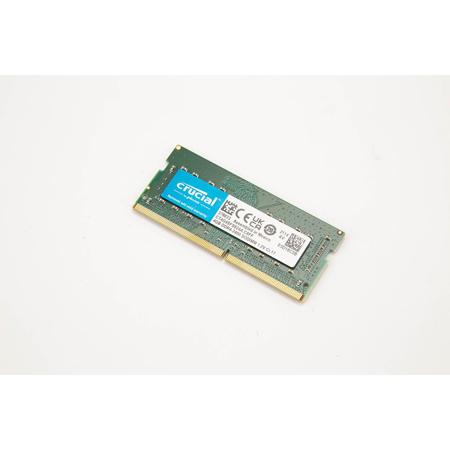
Picture does not represent the actual item
See what's in the box
This item is no longer available.
Review Summary
2020-06-11T10:41:09
The ram is working fine, my iMac appears to be running quit a bit smoother now.
Steven B.
2019-08-21T21:38:05
order on 8/5, 13 business days, still not receive the order. Chat with support, no any use.
Moses T.
2019-03-12T13:09:29
Very satisfied with this purchase.I received this set of 16GB chips quickly and installed easily. My new 27" IMac was upgraded from 8GB to 40GB, up & running within minutes. Performs beautifully.
Bill A.
2019-01-31T06:04:25
Whats to say about this? Works just as it should and was a breeze to install.
Chad D.
2018-03-07T15:56:32
Crucial is a brand of Micron and Micron is an OEM for the Lenovo laptop it was purchased for. Works great as a matched set.
JIM W.
2018-02-08T08:13:15
Nice price and fast delivery.
Monika R.
2017-08-29T12:23:42
Great price, value and quality!
Ross R.
2017-08-17T15:43:34
Excellent shipping, packaging & delivery. Worked like a charm.
S B.
2016-03-16T14:52:14
I ordered those memory upgrades for my clients, arrived on time, excellent experience
SUHAIB A.
SODIMM
4GB
Non-ECC
DDR4 PC4-19200
2400 MT/S
1.2V
17
1x 4GB
260-Pin
Unbuffered
x8 based
512Meg x 64
Single
Quality memory
By JIM W.
Crucial is a brand of Micron and Micron is an OEM for the Lenovo laptop it was purchased for. Works great as a matched set.
The Ram helped
By Steven B.
The ram is working fine, my iMac appears to be running quit a bit smoother now.
More speed. More battery life. More memory capacity. Fuel your next-gen laptop
In the ever-changing world of technology, any component more than five years old is usually in need of an update. At seven years old and counting, that's where DDR3 memory is at: laptops can only do so much with it. Since the introduction of DDR3 memory technology in 2007, processors have doubled in capability, SSDs have revolutionized throughput and graphics cards have drastically increased frame rates, leaving memory as a limiting factor. With Crucial DDR4 SODIMMs, crush the DDR3 memory bottleneck and unlock a new standard of performance.
• Speeds start at 2133 MT/s
• Increase bandwidth by up to 30%
• Reduce power consumption by up to 40% and extend battery life
• Faster burst access speeds for improved sequential data throughput
• Optimized for next generation processors and platforms
• Available in modules up to 8GB and kits up to 32GB
• Limited lifetime warranty
More Energy Efficient
Extend battery life by using less power. Operating at just 1.2V compared to 1.5V for standard DDR3 memory, Crucial DDR4 SODIMMs consume 20% less voltage than standard DDR3 technology. Crucial DDR4 SODIMMs also contain other efficiency features, for an overall power reduction of up to 40%.
More Density
Pack more memory into your laptop than ever before. Crucial DDR4 SODIMMs debut in densities up to 8GB and as DDR4 technology develops, modules are projected to hit 32GB - allowing you to install twice as much memory as you could in a DDR3 system. Since laptops only have 1-2 memory slots, high-density Crucial DDR4 SODIMMs allow you to overcome this limitation and install more memory for faster mobile performance.
More Speed
Load applications faster and run demanding programs without lag. Crucial DDR4 SODIMMs debut at 2133 MT/s -more than 30% faster than DDR3 modules.
More Bandwidth
Effortlessly multitask between apps and empower your system to fire on all cylinders. Crucial DDR4 SODIMMs increase memory bandwidth by over 30%, allowing your system to handle more data at once. Crucial DDR4 SODIMMs are optimized for next-gen platforms, allowing you to maximize bandwidth.
Memory spec terms
If you're not sure if a module is right for your system, use the Crucial Memory Advisor tool for a list of guaranteed compatible modules.
NON-ECC/Non-parity
Most desktop and laptop computers take NON-ECC or Non-parity memory.
ECC/Parity
ECC or parity modules look for errors in data and are most often found in servers and other mission-critical applications used by large networks and businesses.
Unbuffered
Most PCs and workstations use unbuffered memory which is faster than registered memory.
Registered/Buffered
Registered or buffered modules delay all information transferred to the module by one clock cycle. This type of memory is primarily used in servers.
Fully buffered
Designed for next-generation servers, features an advanced memory buffer.
CL
CAS (column address strobe) latency, which is the number of clock cycles it takes before data starts to flow after a command is received. Lower CL is faster. Modules with different CL can be mixed on a system, but the system will only run at the highest (slowest) CL.
Component configuration
(For example: 64Meg x 64) Indicates the size of the memory chip components on the module.
Voltage
For example 2.6V. Indicates the power used by the module. The lower the better.